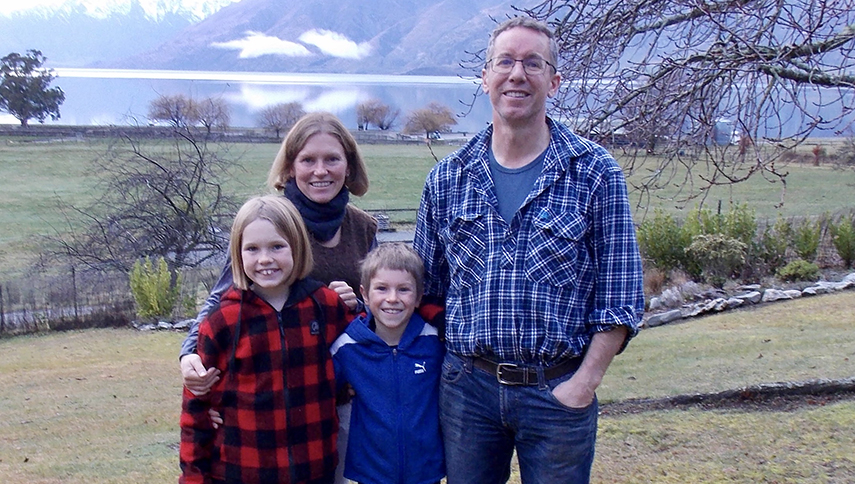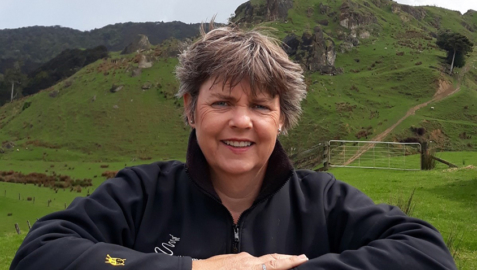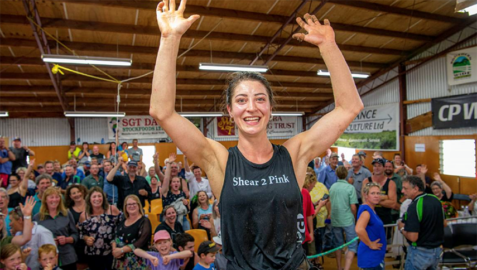
Lucky to be alive
Module Overview
Sheep and beef farmer Jack Cocks almost died from an aneurysm. Now he’s sharing with other farmers what his recovery taught him about resilience.
Jack’s part of the team that runs Mt Nicholas, a high-country merino sheep and cattle station, on the western shores of Lake Wakatipu. “I grew up on a sheep and beef farm, went to uni, travelled overseas and came back and worked in an agribusiness consultancy. My wife Kate and I came here to work in 2009. There’s a team of four of us that run the farm. It’s probably more of a democracy than a lot of farms but it works well. It means we can use all our different skills.”
Jack says Mt Nicholas is a great place to work and raise a family (they have two kids). “Although we’re in an isolated situation, there is a team of us here so we might see more people during our working day than many sheep and beef farmers. I really love what farming offers – that mix of running your own business as well as working outside doing practical things. We enjoy a huge variety of work.”
All that was suddenly at risk when he suffered his aneurysm in 2013. “I’m very lucky to be here,” he says, remembering the night it happened. “I was born with a malformation between some of the blood vessels in my brain. That caused an aneurysm to form. I had no idea I had it, let alone what an aneurysm was! One night I was reading in bed, my wife Kate was away working at a tourism event down at the woolshed and I got a splitting headache so bad I was sick a few times. I rang her and said, ‘you’ve got to come home’. She came home expecting the house to be in chaos, but found it dark and quiet and me in bed pale, cold and sweating. While she was ringing 111 I had a seizure. A helicopter arrived in the middle of the night. By then my lungs were bleeding and I was unconscious. On the way to Dunedin hospital I had a cardiac arrest. They did a CT scan and found my brain was full of blood. In layman’s terms the neurosurgeon drilled a hole in my skull to relieve the pressure. They thought I’d be dead that day … but somehow I survived.”
Getting through and staying positive
What followed would test anyone’s resolve. Jack spent 4 months in hospital and had 8 surgeries over the next two years. He recovered to 70% and then spent a further two years doing rehab and recovered to 90% before another serious setback required a further half a dozen surgeries and another four months in hospital followed by more rehab. “I couldn’t brush my teeth at one stage because of nerve damage to my spine and I had to learn to walk again using a walking frame. So it was journey full of setbacks,” he says.
But Jack kept going through it all – the stints in hospital, the endless rehab, the setbacks. Cut to the present. “I’m about 90% recovered now. My balance and eyesight aren’t 100%, but basically I’m back to normal, working full time, and I feel incredibly lucky to be here.”
Jack’s journey impacted his life in other ways too. Laid up in hospital, he did a lot of thinking about what was helping him get through and remain positive. “I figured out I needed five things. Most farmers would think up these things sitting in their tractor or standing in a milking shed, but I had to figure it out in a hospital bed,” he laughs.
“The first two were contribution and stimulation – being able to contribute to our household and our farming business and get stimulation from that. For example, when my arms were messed up, just being able to hang out the washing was an accomplishment.”
“Staying connected and spending time with my family, our staff and mates was another big one. That was key for morale.”
“Keeping fit was important too. I soon learnt that exercise is great for the mind. It just feels good to be moving round. When my arms were weak I did weights every couple of nights in the lounge to regain some strength. I did a lot of walking too.”
“The last thing I found really helped was having a laugh. It’s important to be able to laugh at yourself and not take life too seriously,” he says.
He also came up with a strategy for managing stress as he battled to get well – focus on the process.
“If you can just focus on the process of something rather than obsess about the result, I find it really helps. In a farming context, for example, instead of worrying about your lambing percentage, if you just focus on putting the ram out, getting the genetics right, keeping the sheep healthy, feeding them properly, all those process things, then before you know it you’ve reached your result. That’s been a big thing for me. When I had a setback, I just focused on the practical steps I needed to take to improve things. Before I knew it, I was back at 90%.”
Focusing on the big picture
There’s no doubt that Jack’s experience has given him a greater appreciation of life and farming as a whole. These days he sees the ‘big picture’.
“As farmers we’re buffeted by so many external factors beyond our control that it’s easy to focus on the negatives and forget about the good things that are constantly happening. That’s why it’s important to celebrate your wins. Instead of thinking, ‘it’s too dry’ or ‘there’s a big snow on the way’ or ‘the dollar’s too high’, why not celebrate the fact that your ewes are in tremendous order, your feed is finishing your lambs well or your animal health programme means your cattle are healthier than ever. If you stop to notice and celebrate these things – and it could be as simple as just writing them down – I’m convinced it keeps you and your business in good shape.”
Jack says he also learnt to trust the wisdom and advice of the many medical professionals he met during his recovery. “They are so used to dealing with hardship and sad stories that I learnt a lot from them which helped me stay positive in my situation.”
Which is why Jack’s now keen to pass on his own wisdom. He’s been giving talks to other farmers and is about to start a Kellogg project at Lincoln University exploring how farmers cope with adversity.
“I’m interested in talking to farmers who’ve faced adversity and change – personal, financial or climatic – and see if I can pull together some simple ideas on what can make farmers more resilient because as farmers we are buffeted by so many external forces that we do need to be resilient.”
“The things I did – exercise, rest/recovery, focusing on the process during my rehab, celebrating success and connecting with and learning from others – really worked for me. I’m happier and more content, I’m also fitter and stronger when I’m working in the business. My life is better balanced now.”
“The reaction I’ve had to my story from farmers has been humbling and surprising. I was reluctant to talk about it at first because I didn’t think what I did was remarkable. I just did what I had to do, but I’ve come to see that by articulating my experience, I’m able to give back and help others. If someone else can benefit out of what I’ve experienced – great.”
Farmstrong is an award-winning rural wellbeing programme that helps farmers and farming families live well to farm well. To find out what works for you and ‘lock it in’, check out our farmer-to-farmer videos, stories and tips on www.farmstrong.co.nz.


